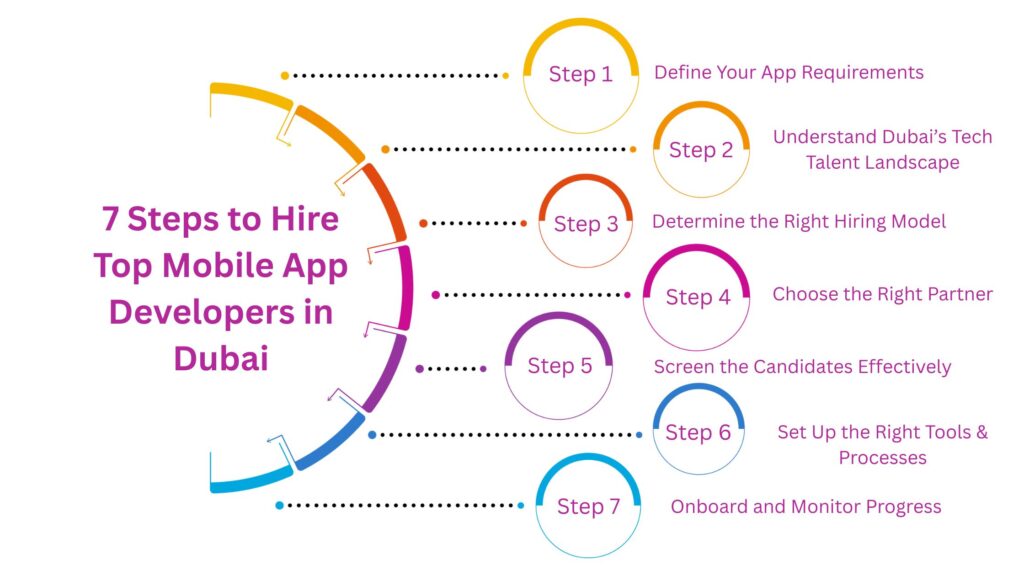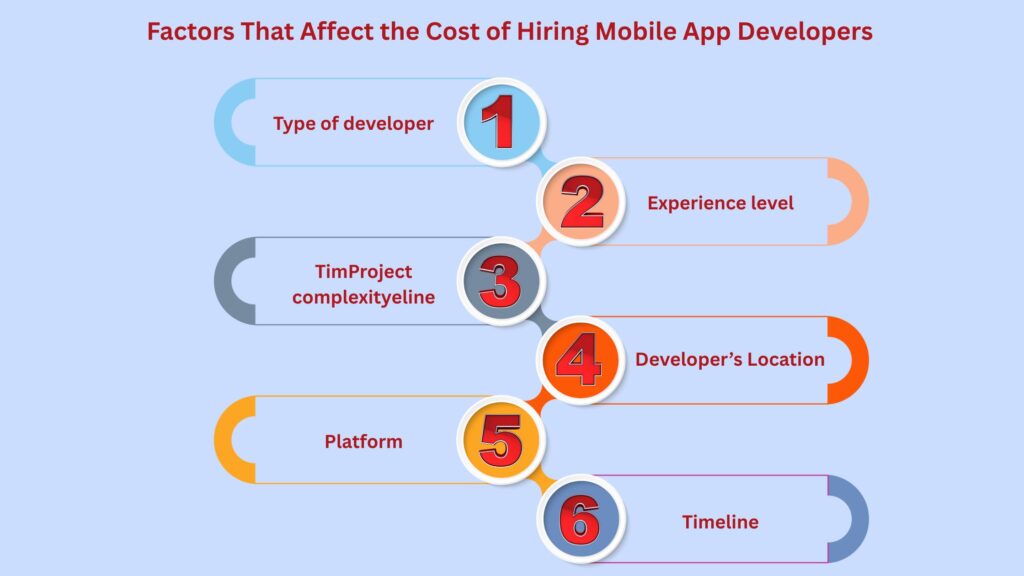Since it serves as a platform for top-notch mobile applications, users choose hiring Dubai-based mobile app developers. Behind the city’s glitz is a rapidly rising pool of designers, engineers, and digital visionaries who can transform an app idea into a global product. However, with top talent in high demand, finding the appropriate developer requires a well-thought-out strategy. This article outlines a 7-step method for hiring app developers in Dubai, enabling you to access world-class expertise for app development.
From Botim to EEMO, and Snapchat to TikTok, these are outstanding instances of high-performance apps that outperform their competitors. And if you want to create an app like these that will flourish in today’s competitive business environment, hiring mobile app developers in Dubai is the way to go.
The top benefits of hiring app developers in the UAE include access to a global talent pool, cutting-edge technology, experienced developers, and a speedier time-to-market. There are various advantages; however, to do this, you must first choose the appropriate mobile app developers, which is where you must prepare.
Not too chaotic, but recruiting mobile app developers in Dubai, like anywhere else, necessitates a predetermined strategy, which this blog will guide you through. The blog provides a 7-step procedure for hiring a mobile app development business in Dubai, explaining the tech skills, cost, and factors that can impact it, making the hiring process easier.
Things to Understand Before You Hire App Developers in the UAE
There are numerous factors to consider while hiring mobile app developers in the UAE. The area has a thriving technology environment, with Dubai and Abu Dhabi at the vanguard of the digital revolution. The market is competitive; therefore, it’s critical to grasp the larger backdrop of hiring in the UAE.
It’s critical since the success of your app development is heavily reliant not only on who you hire, but also on how effectively you’re prepared to collaborate with them. Here are some factors to consider when hiring app developers in the UAE:
- The UAE market is competitive, making top developers in high demand; therefore, you should have a clear pitch or project brief to stand out. It quickly shows developers your scope, vision, and seriousness, making them more likely to engage and prioritize your app development project.
- Developing a mobile app isn’t just about coding; it includes planning, design, developing, testing, and post-launch support. Therefore, ensure the app developer you’re going to hire offers more than just development skills to ensure quality product development.
- Cultural and business etiquette matters; hence, understanding local work norms, holidays, and communication preferences can help you build better working relationships.
- Besides, legal aspects like NDAs and IP protection should be taken care of from the very beginning of the project development to avoid issues down the line.
Understanding these foundations when you hire app developers in the UAE helps you approach the hiring process with confidence and make adequate decisions throughout your app development journey.

7 Steps to Hire Top Mobile App Developers in Dubai
When you hire a mobile app developers in Dubai, having a predefined approach gets you in the right direction. Here’s the 7-step approach on how to hire mobile app developers, including defining your requirements, understanding Dubai’s tech landscape, determining the right hiring model, screening & hiring candidates, and many more to ease the hassle of hiring the right developer.
Step 1: Define Your App Requirements
First and foremost, precisely outline your app’s requirements. It entails identifying your target audience, the app’s goals, and the features and functionalities required to achieve the target. Conduct thorough research to determine which platform will reach the majority of your target audience.
For example, if the bulk of your target audience uses iOS, look for an iOS app development business to create an iOS-compatible app. In contrast, if the majority of them use Android, consider Android app development. If you wish to target both platforms, contact a cross-platform app development business to create a mobile application that works across both.
Determine other requirements such as Flutter, React Native, Swift, and Kotlin tech stacks, as well as UI/UX design service demands. Furthermore, decide on the features and functionalities you want to include in the app, as well as a reasonable timeline and cost.
Pro Tip: Get in touch with an MVP development company and start with a Minimum Viable Product (MVP) to test your concept.
Step 2: Understand Dubai’s Tech Talent Landscape
The second step you should take is to learn about Dubai’s technology scene. Dubai is a thriving technology hub, with a mix of local and international professionals, as well as a plethora of software development outsourcing organizations and freelancers. As a result, determining which one is best suited to your project requirements is critical.
In addition to an overview of the developer talent pool, we will look at Dubai’s regulatory compliance and business environment, as well as the advantages of employing mobile app developers in Dubai.
Pro Tip: Explore each one of the aspects, gauge the developer, and go with the one that is most suitable for your project needs.
Step 3: Determine the Right Hiring Model
After determining the requirements and understanding Dubai’s IT scene, the third stage is to select the appropriate hiring approach. You can choose from a variety of recruiting methods, including hourly, monthly/full-time contract, fixed-price project, milestone-based, and more. See the table below to learn more about each recruiting model, what they are best suited for, and their advantages and disadvantages:
| HIring Model | Suitable for | Pros | Cons |
| Hourly Basis | Short-term tasks, ongoing maintenance, and uncertain scope | Pay for actual hours worked; flexible scope | Harder to predict total cost; requires close tracking |
| Monthly/Full-Time Contract | Long-term projects, continuous development | Dedicated developer focus, stable workflow | Higher commitment may pay for idle time |
| Fixed-Price Project | Well-defined scope and deadlines | Clear budget, predictable costs | Less flexibility for changes, scope creep risk |
| Milestone-Based | Medium to large projects with clear phases | Payment tied to deliverables; shared accountability | Delays in one milestone can stall the project |
| Retainer Model | Ongoing support and updates | Guaranteed availability builds long-term relationships | Paying regardless of workload variations |
Pro Tip: Choose a hiring model based on project clarity, budget flexibility, and your ability to manage the team, not just on cost.
Step 4: Choose the Right Partner
Examine carefully and select the best partner who can help you achieve your goals. Seek answers to the following questions from your possible mobile app developer, and choose the one whose response satisfies you and assures you of their capabilities:
- Do they have experience with apps like mine?
- Can they build it the right way, technically and visually?
- How long will it take to build the mobile app?
- How much will it cost, and is it worth it?
- Will it be high-quality and bug-free?
- How will we communicate and collaborate?
- Will my idea be confidential?
- Will they support me after launch?
- Am I choosing the right mobile app development company for the long run?
See the table below to know the type of software development partner you should hire based on your needs and requirements:
| Developer’s Type | Suitable for | Pros | Cons |
| Mobile App Development Company | End-to-end solutions, ongoing support | Full team and management | A bit expensive upfront |
| Freelancers | Small projects, prototypes | Cost-effective and flexible | Quality and communication risk |
| In-House Team | Long-term, large-scale development | Better control and collaboration | High overhead cost |
| Staff Augmentation | Scale fast with vetted developers | Flexible scaling | Requires internal oversight |
Pro Tip: Don’t just look for a service provider; look for a partner who understands your business goals and is invested in your app’s long-term success.
Step 5: Screen the Candidates Effectively
After you’ve examined, thoroughly evaluate the prospects to ensure that you hire individuals who are qualified to work on your project. First, check the developer’s portfolio and past apps (download and try them).
Consider evaluating the understanding of specific frameworks, such as Flutter and React Native. To make it even better, conduct live coding assessments or assign a little task to check their proficiency.
Soft Skills & Cultural Fit:
Needless to say that technical skills are a priority; however, soft skills are those you shouldn’t afford to overlook when hiring mobile app developers. Test and measure the communication skills and team collaboration style of an app developer, along with the time zone availability. It helps you ensure you’ve a highly skilled team to work on your project.
Pro Tip: When in doubt, start with a small paid test project; it’s the fastest way to verify both the technical skills and the communication style of a mobile app developer.
Step 6: Set Up the Right Tools & Processes
Once you’ve hired the right developer, set up the right tools and processes to get started on app development. The right tools and processes ensure smooth collaboration, transparency, and high-quality results.
Make use of project management tools like CollabCRM, Jira, Trello, ClickUp, and Asana to help you track tasks, manage deadlines, and assign responsibilities. You can create a roadmap with milestones so everyone knows the bigger picture.
Use communication platforms, for example, Slack, Zoom, and Microsoft Teams, enabling quick discussions, video meetings, and decision-making. Set agreed communication hours, especially when you’re working with remote teams.
Leverage platforms like GitHub, Bitbucket, and GitLab to store, manage, and review code in a secure, organized way. For QA & testing tools, you can go with Selenium, Appium, and BrowserStack to make sure your app works flawlessly across devices and operating systems.
Pro Tip: Document your workflow and tool usage from day one so any new team member can integrate smoothly without slowing down development.
Step 7: Onboard and Monitor Progress
Hiring top mobile app developers is only half the job, as getting them aligned with your mission and vision, and keeping the project on track, is equally important. Now, conduct a smooth onboarding process and continuous progress monitoring to ensure developers deliver high-quality results without delays.
Share your mobile app’s purpose, target audience, and key objectives, and give developers access to technical specs, wireframes, and design assets. Make sure the developer has access to project management, communication, and version control tools. Connect them with designers, testers, and other stakeholders.
Monitor progress effectively using project management tools like CollabCRM, Jira, Trello, and ClickUp to track tasks. Conduct regular check-ins to discuss updates and resolve blockers. Do testing early and often to catch issues before they grow. Share constructive feedback promptly, while also recognizing achievements to keep morale high. Don’t miss out on keeping discussions solution-oriented.
Pro Tip: If you outsource mobile app development and work with remote developers, schedule overlapping working hours for real-time collaboration and quicker problem-solving.
Top Skills to Look for in a Mobile App Developer
There are many skills and abilities you should measure when hiring a mobile app developer. Ensure the developer you hire has dexterity in programming languages like Swift/Objective-C for iOS, Kotlin/Java for Android, UI/UX design knowledge, backend expertise, and experience with APIs.
Furthermore, assess their problem-solving abilities, testing and debugging skills, and familiarity with version control systems like Git. Here are the skills and abilities a mobile app developer should be efficient in:
| Skill Area | Technologies / Concepts |
| Programming Language | Swift, Kotlin, Dart, JavaScript, TypeScript |
| Framework | Flutter, React Native, React Native+Expo, SwiftUI, Ionic, NativeScript |
| Platforms | iOS, Android, cross-platform |
| IDEs | Xcode, Android Studio, Eclipse, IntelliJ, Visual Studio |
| Backend Skills | Node.js, Firebase, REST APIs, GraphQL |
| UI Skills | Material Design Kit, Apple HIG, Figma, UIKit, SwiftUI, Android Jetpack Compose, Material Design Kit, React Native Components, Flutter Widgets |
| Testing & QA | Unit testing, Appium, and automated testing tools |
| APIs & Integration | RESTful APIs, GraphQL, GRPC, Stripe, Google Maps, Open Maps, CleverTap, Firebase, etc. |
Pro Tip: A great developer blends technical expertise with user-centered design thinking; hence, avoid hiring on coding skills alone.
How Much Does It Cost to Hire a Mobile App Developer in Dubai?
The hourly cost to hire a mobile app developer in Dubai ranges from $15 to $138; however, it may vary depending on various aspects. Factors like project complexity, features and functionalities, developers’ experience and expertise, project complexity, and whether you hire a freelancer or a company can differ the cost significantly.
When it comes to the fixed-price model, a basic app might cost $10,000 to $80,000, while more complex apps can reach $300,000 or more, depending on the factors above, or some additional ones. Look at the table below to know the generic price in detail for mobile app development:
| Developer/Development Type | Estimated Cost |
| Mobile App Development Company | $10,000 – $300,000+ per project |
| Freelancers | $15 – $70+ per hour |
| In-House Developers | $3,000 – $7,000+/month |
| Cross-platform App (MVP) | $8,000 – $20,000 |
| Complex Native App | $30,000 – $100,000+ |
Since it varies depending on a variety of factors, answering the question “How much does it cost to build a mobile app?” isn’t that easy before a developer knows your requirements in detail. Therefore, contact a mobile app development company, and let them know what you actually need for an exact cost estimation.
Pro Tip: Consider all aspects, compare many, and choose the one that is suitable for your project.

Factors That Affect the Cost of Hiring Mobile App Developers
There are aspects that can significantly vary the cost to hire mobile app developers. They may involve the type of developer, their experience level, project complexity, platform, timeline, and more. Here’s how they differ the cost and how you can manage them efficiently:
- Type of developer: If you hire an in-house team, it can be more expensive because of the overhead costs, while outsourcing offers flexibility and potential cost benefits with access to a wider talent pool.
- Experience level: Hiring junior developers costs lower hourly rates but may require more supervision, while a senior developer charges higher rates but brings more experience and expertise.
- Project complexity: A simple app, with basic functionalities, minimal design, and fewer features, leads to lower development costs, while an app with advanced features, custom animations, integrations, and intricate UI/UX designs requires a higher development cost.
- Developer’s Location: Developers in areas with a high cost of living, like the US, tend to have higher hourly rates. Hiring developers from regions like Eastern Europe or parts of Asia (India) is less expensive.
- Platform: iOS app development is more likely to be costly compared to Android due to strict guidelines and design expectations. Android development cost can vary because of the range of devices and screen sizes.
- Timeline: The shorter timeline for app development, too, influences the cost to hire mobile app developers.
Pro Tip: If you’re on a tight budget, start with an MVP and iterate; it reduces upfront costs while validating your idea.
Choose RichestSoft, Because Your App Deserves Better than Average
According to Statista, people abandon apps after the first use, and I’m sure you don’t want your mobile app to be one of them. That’s where RichestSoft comes in! Whether you need to create a native iOS app, complete Android app development services, or simply a cross-platform application, we’re the one-stop shop for you.
From MVP to UI/UX design, bespoke app development, startup app development, and beyond, we use our years of experience and expertise in mobile app development to create apps that match your specific business requirements. To have a better understanding of how we work, consider how RichestSoft assisted KFC in improving its meal ordering experience, such as 30% increase in production efficiency and a 20% increase in downloads and sales.
We help you employ Android app developers, iOS developers, or cross-platform developers in a variety of industries, including healthcare, e-commerce, FinTech, and education. So, if you have a unique idea that has to be executed, contact us and we will convert it into a mobile application.

